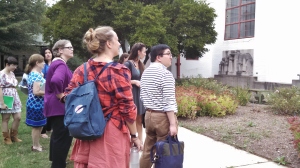Local History/Archives/Collections/Library & Information Studies
The Chevy Chase Historical Society (CCHS), a nonprofit membership organization, has been collecting material relevant to the area for 35 years. The CCHS archives represent a unique resource for scholars, students, and residents of Chevy Chase, Maryland, one of the earliest planned streetcar suburbs in the United States. The archives contain approximately 15,000 photographs; 400 maps; more than 100 oral histories; a variety of documents types including memoirs, municipal records,
personal papers, letters, and yearbooks; a noncirculating reference library; and a vertical file of pamphlets, clippings, and other materials.
CCHS is searching for a Director of its Archive and Research Center.
The Director is paid on an hourly basis for approximately 30 hours per week. The starting contract rate is $25 per hour. The Archive and Research Center is open to the public on Tuesdays, from 10:00 am to noon and 1:00 to 3:00 pm. The Director must be at the Center during those hours to greet and assist visitors and researchers. Occasional evening and weekend hours will be required. The schedule for the
remaining hours is flexible and open to negotiation. The Director reports to the CCHS President, the Archives Committee, and the Board of Directors.
Primary responsibilities include:
1. Planning, directing and coordinating the daily operations of the Archive and Research Center, including responsibility for maintaining the CCHS archives by accessioning, arranging, digitizing, describing, and re-housing current and new manuscript collections, photographs, maps, and other material, as well as implementing basic preservation methods, and/or supervising staff and volunteers working on these same tasks.
2. Managing the human resources of the center by recruiting an Assistant Director and/or graduate interns and volunteers, and supervising and training staff and volunteers in an effective and collegial manner.
3. Providing reference/research assistance for patrons, volunteers and interns.
4. Conceiving and overseeing the creation of new online exhibits drawn from the archive.
5. Overseeing research and writing of a house history for the annual CCHS Gala, and the design and production of the physical exhibit created for the event.
6. Managing regular updates of the CCHS web page and social media.
7. Managing the Archive and Research Center in compliance with the annual budget.
8. Preparing and presenting a written report on activities at the center at CCHS board meetings, which are typically held 10 times a year, usually in the evening.
9. In addition to the responsibilities listed above, collaborating with CCHS Board Committees as needed in an ex officio capacity.
10. Maintain the facility by monitoring environmental conditions and coordinate with outside vendors, contractors, maintenance crews, and etc.
We also expect you to:
1. Demonstrate excellent interpersonal skills, and establish and maintain effective working
relationships with CCHS board members, staff, volunteers, and members of the public.
2. Serve as the public face of the CCHS Archive and Research Center, demonstrating
enthusiasm for local history, and a commitment to preserve and share the history of Chevy Chase with CCHS members, local residents, and all interested members of the public.
3. Be familiar with, or quickly able to learn, information technology used in small historical societies and museums, such as PastPerfect, as well as website content management systems, such as Drupal.
4. Have relevant historical research experience for assisting patrons as well as staff, board members, and volunteers.
5. Have a demonstrated knowledge of US History in general, and be familiar with, or quickly able to learn, the history of Chevy Chase, Maryland and the greater metropolitan area of Washington, D.C.
6. Understand the dynamics of working with board members and other volunteers.
7. Be a self-starter, independent worker, and creative problem-solver.
8. Have excellent oral and written communication skills and administrative skills.
Qualifications:
Required:
1. A Master’s Degree or advanced coursework in History, Archival Studies, Library Science, or Museum Studies.
2. At least three years of direct experience in the field of archival management.
3. Demonstrated strength in written, verbal, analytical and interpersonal skills. Ability to work independently and collaboratively and to prioritize work to ensure timely completion of projects. Aptitude for complex, analytical work with attention to detail, demonstrated problem-solving skills, flexibility, and creativity.
4. Strong computer skills, with experience using MS Word, Publisher, Excel, and other Office programs.
5. Knowledge of professional standards and best practices concerning archives, historical societies, and museums.
Preferred:
6. Experience using archival managements systems, such as PastPerfect. Experience with graphic design software and content management systems such as Photoshop and Drupal.
7. Experience providing reference/research assistance for patrons, volunteers, and interns.
8. Experience supervising and training staff, interns, and volunteers.
9. Participation/involvement in relevant professional organizations.
Deadline for application: April 6, 2018.
Review of candidates will begin on March 23, 2018. Prompt applications are encouraged.
Please email (preferred) or mail a letter of application addressing your qualifications, a resume, and contact information for three professional references to: director@chevychasehistory.org
Or via mail to: Chevy Chase Historical Society
8401 Connecticut Avenue, Suite 1010
Chevy Chase, Maryland 20815
If you have questions, please email CCHS at the address above or call 301-656-6141.



